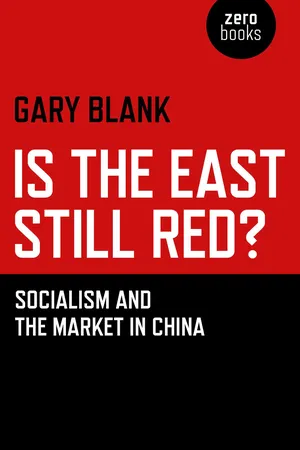
- English
- ePUB (mobile friendly)
- Available on iOS & Android
eBook - ePub
About this book
Does China represent a non-capitalist alternative to neoliberal development models? Commentators on the left have offered sharply divergent assessments over the last two decades. A few still cling the old dream of market socialism, twinning efficiency with social justice. For most, however, China is proof that market reforms invariably yield dispossession, inequality, and capitalist restoration. Is the East Still Red? argues that both interpretations are wrong and exhibit a common failure to distinguish between market mechanisms and capitalist imperatives. Gary Blank situates the Chinese experience within broader Marxist debates on socio-historical transitions and primitive accumulation, highlighting the need to conceptualize capitalism as a unique system in which producers and appropriators depend on the market for their reproduction. Despite years of marketization, the mandarins in Beijing have not yet imposed full market dependence in industry and agriculture. He shows how the resistance of workers and peasants, the imperatives of party-state legitimacy, and the reproductive strategies of individual Communist officials and managers all act to perpetuate central aspects of a bureaucratic-collectivist system, in which direct producers and bureaucrats are effectively merged with the means of production. The People's Republic may be a non-capitalist market alternative, albeit one that is hardly edifying for socialists.
Frequently asked questions
Yes, you can cancel anytime from the Subscription tab in your account settings on the Perlego website. Your subscription will stay active until the end of your current billing period. Learn how to cancel your subscription.
No, books cannot be downloaded as external files, such as PDFs, for use outside of Perlego. However, you can download books within the Perlego app for offline reading on mobile or tablet. Learn more here.
Perlego offers two plans: Essential and Complete
- Essential is ideal for learners and professionals who enjoy exploring a wide range of subjects. Access the Essential Library with 800,000+ trusted titles and best-sellers across business, personal growth, and the humanities. Includes unlimited reading time and Standard Read Aloud voice.
- Complete: Perfect for advanced learners and researchers needing full, unrestricted access. Unlock 1.4M+ books across hundreds of subjects, including academic and specialized titles. The Complete Plan also includes advanced features like Premium Read Aloud and Research Assistant.
We are an online textbook subscription service, where you can get access to an entire online library for less than the price of a single book per month. With over 1 million books across 1000+ topics, we’ve got you covered! Learn more here.
Look out for the read-aloud symbol on your next book to see if you can listen to it. The read-aloud tool reads text aloud for you, highlighting the text as it is being read. You can pause it, speed it up and slow it down. Learn more here.
Yes! You can use the Perlego app on both iOS or Android devices to read anytime, anywhere — even offline. Perfect for commutes or when you’re on the go.
Please note we cannot support devices running on iOS 13 and Android 7 or earlier. Learn more about using the app.
Please note we cannot support devices running on iOS 13 and Android 7 or earlier. Learn more about using the app.
Yes, you can access Is the East Still Red? by Gary Blank in PDF and/or ePUB format, as well as other popular books in History & Chinese History. We have over one million books available in our catalogue for you to explore.
Information
Table of contents
- Cover
- Title Page
- Copyright
- Contents
- Dedication
- Acknowledgements
- Chapter One: Introduction: Whither Chinese Socialism?
- Chapter Two: Leftist Assessments of Socialist China: Then and Now
- Chapter Three: Clarifying Capitalism: How is it a Unique Social Form?
- Chapter Four: Returning to Socialist ‘Transition’: Plan, Market and Bureaucracy
- Chapter Five: Deng Xiaoping’s Market Turn
- Chapter Six: The Fifteenth Party Congress and the Era of Mass Privatization
- Chapter Seven: Conclusion
- Notes